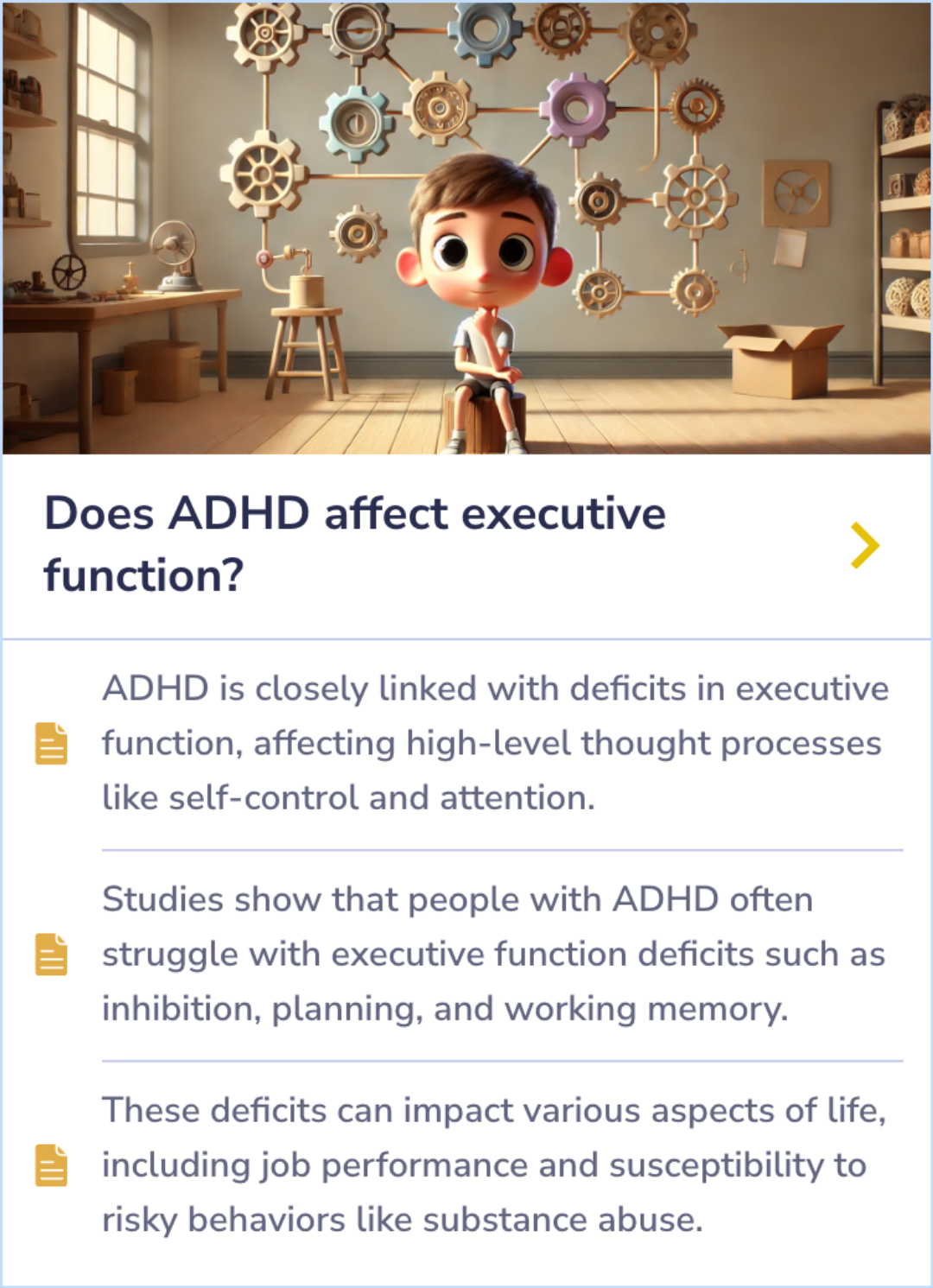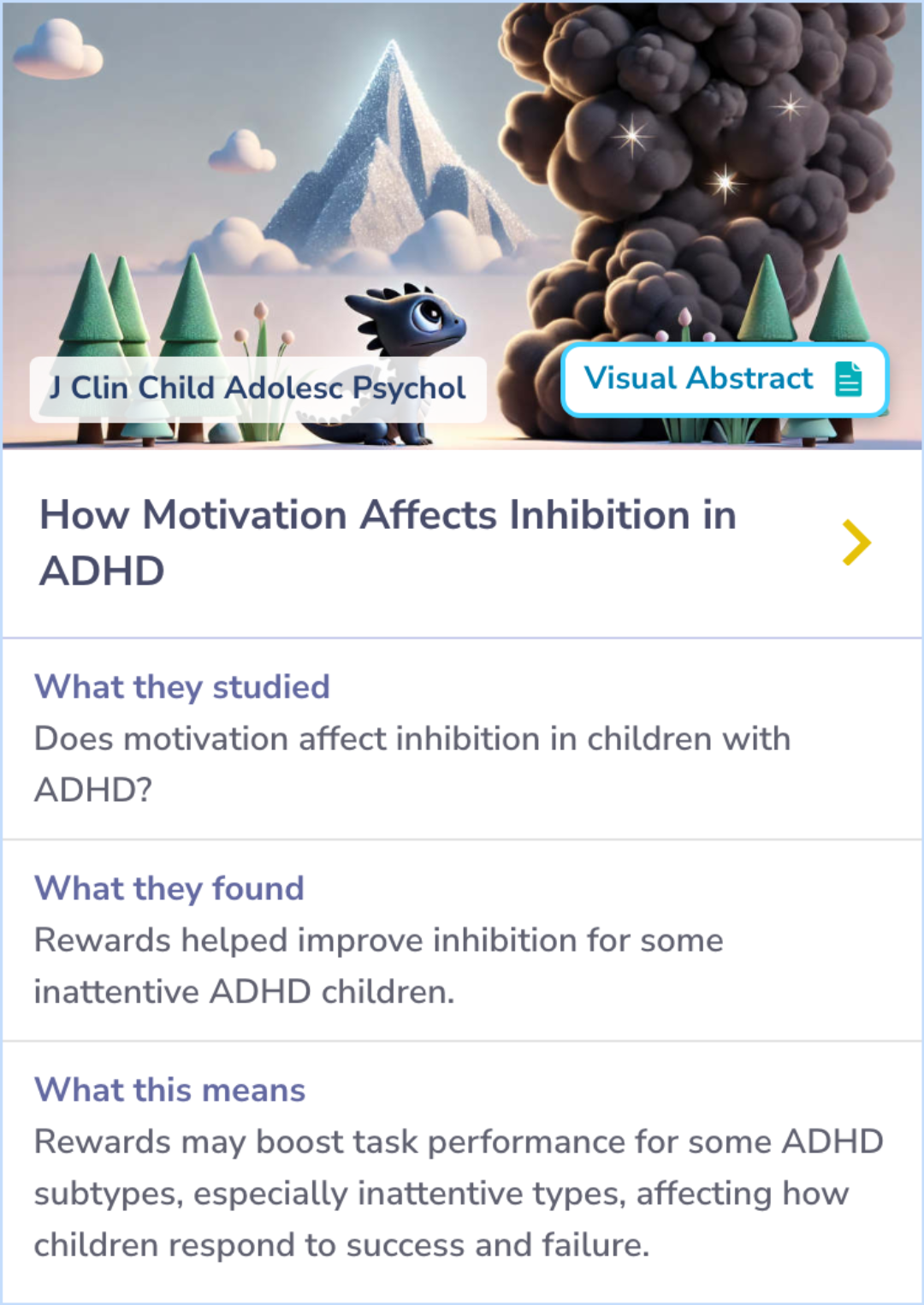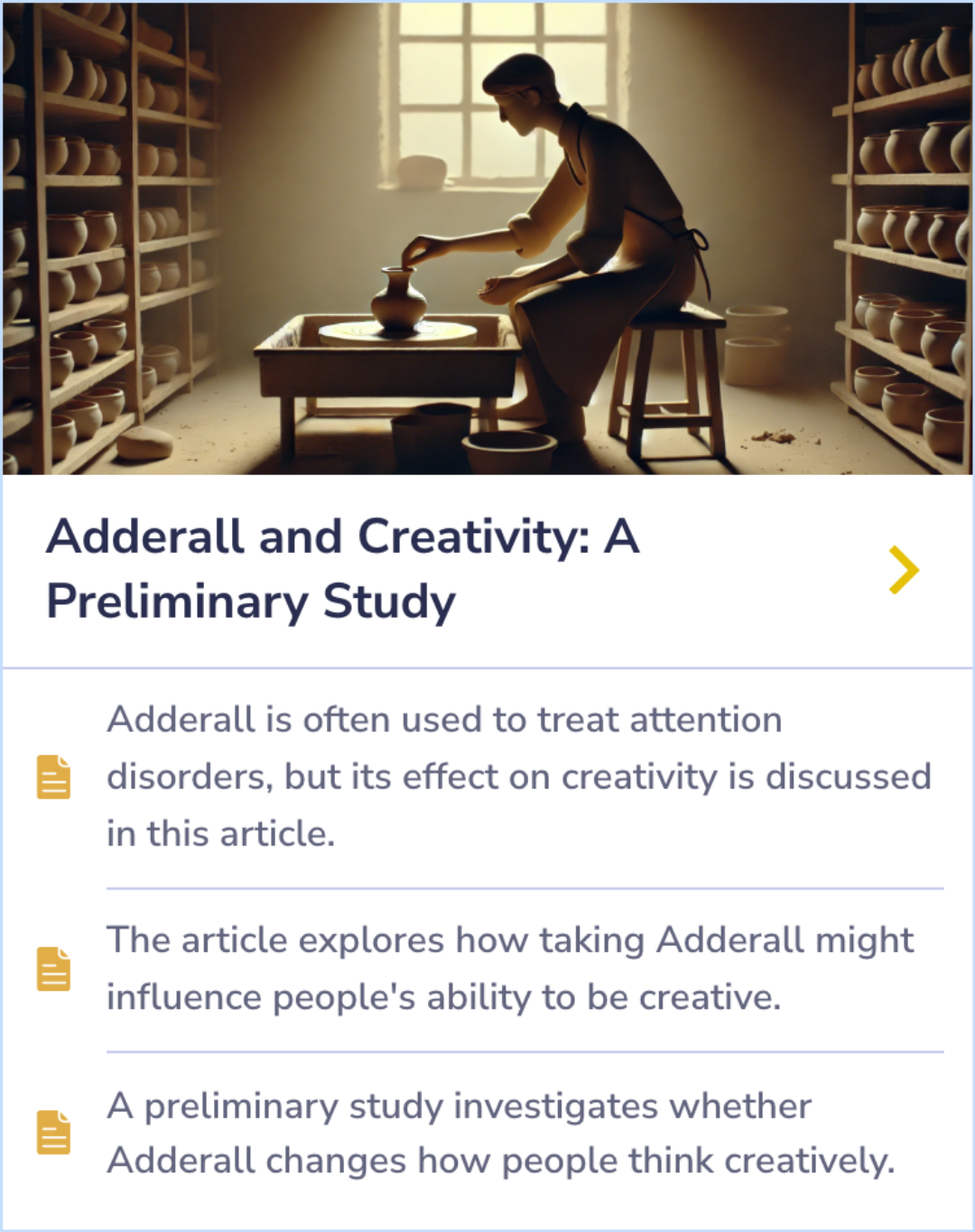Adderall
Evidence Based Answers
What Are the Long-Term Effects of Amphetamines on Cognitive Function in Adults?
Using Ritalin without ADHD might alter brain chemicals, affecting focus and mood. It involves neurotransmitter changes which could bring risks to cognitive health.
Published: October 24, 2024
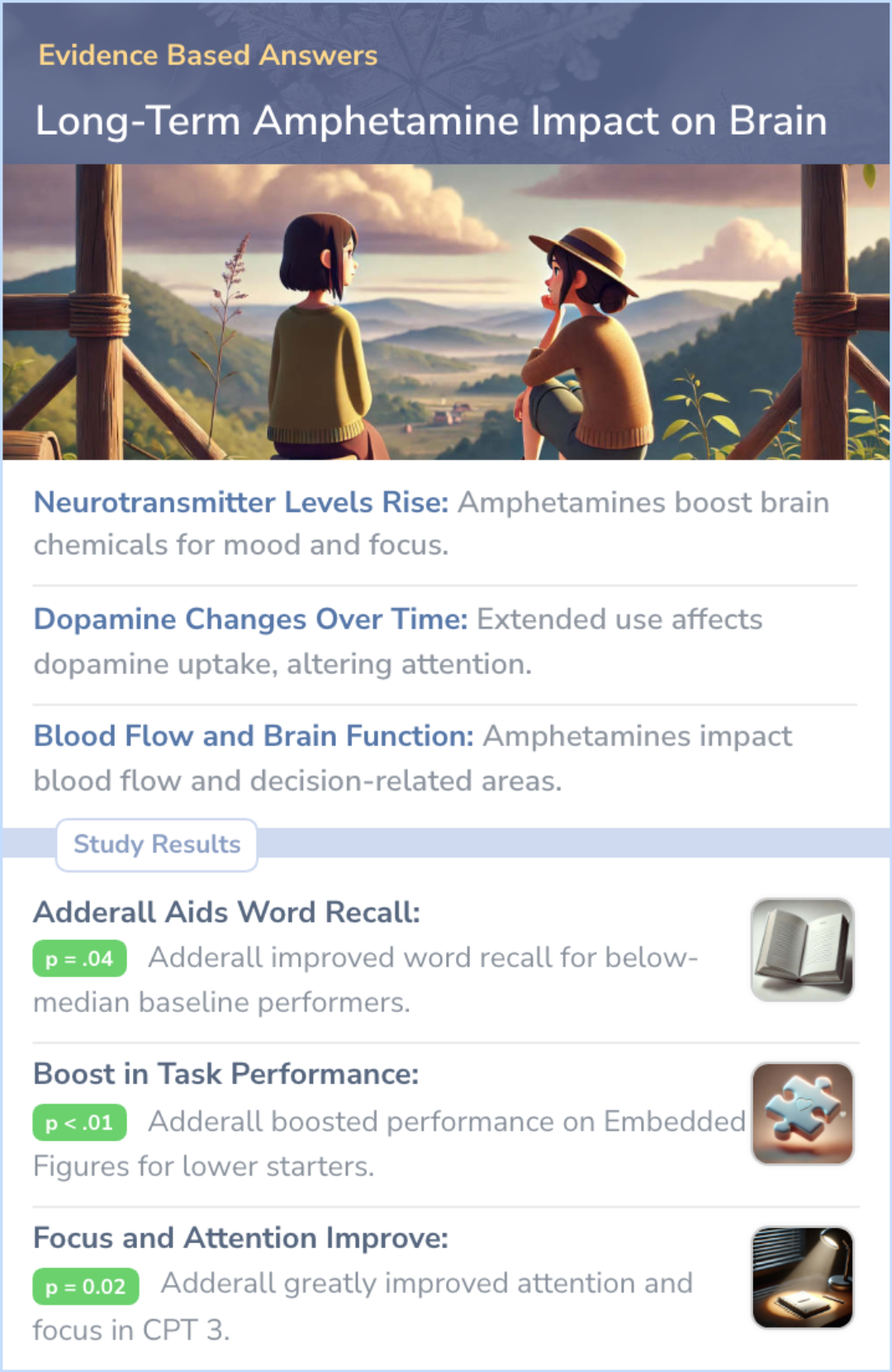
Studies Summary
🔍
Minimal Cognitive Enhancements in Youth
Research indicates that mixed amphetamine salts (MAS) do not significantly improve cognitive function in healthy young adults. Although some participants perceived enhanced performance, actual improvements were mostly limited to those with lower baseline abilities.
📘
Adderall's Limited Impact on Cognition
A study on healthy college students revealed that Adderall, commonly used for ADHD, shows minimal effects on cognitive functions. Its perceived benefits might be exaggerated, with results primarily affecting mood rather than cognitive ability.
🧠
Effective ADHD Symptom Management
Mixed amphetamine salts extended-release (MAS XR) led to significant reductions in ADHD symptoms among adults, particularly at higher doses. Improvements were observed early in the treatment journey, with mild to moderate side effects.
Highly Cited Studies
Long term Effects of Methylphenidate in Adults
Peer Reviewed Study 1
Limited Cognitive Benefits from Amphetamines in Healthy Adults
Peer Reviewed Study 2
Minimal Cognitive Benefits of Adderall in Healthy Adults
Peer Reviewed Study 3
Impact of Amphetamines on ADHD Symptoms in Adults
Background: How Amphetamines Affect Neurotransmitter Levels
Amphetamines increase levels of neurotransmitters like dopamine, norepinephrine, and serotonin in the brain. These chemicals are important for mood, attention, and executive function.
Amphetamines work by blocking reuptake and enhancing the release of these neurotransmitters, leading to higher concentrations in the brain.
Amphetamines work by blocking reuptake and enhancing the release of these neurotransmitters, leading to higher concentrations in the brain.
“
Source Quotes:
Amphetamine actions include dopamine and norepinephrine transporter inhibition, vesicular monoamine transporter 2 (VMAT-2) inhibition, and monoamine oxidase activity inhibition.
Amphetamine is a central nervous (CNS) system stimulant that functions by increasing the amounts of dopamine, norepinephrine, and serotonin (to a lesser extent) in the synaptic cleft through a variety of mechanisms.
Background: Long-Term Dopamine Changes
Long-term use of amphetamines can alter dopamine levels in the brain. Prolonged exposure, even at prescribed doses, may affect dopamine transporters, leading to reduced dopamine uptake.
These changes could have implications for cognitive function, as dopamine is involved in attention, motivation, and reward pathways.
These changes could have implications for cognitive function, as dopamine is involved in attention, motivation, and reward pathways.
“
Source Quotes:
Amphetamine increased surface trafficking of dopamine transporters and dopamine uptake, but continued amphetamine exposure results in decreased surface expression of the dopamine transporter and decreases in dopamine uptake.
Concerns have been voiced that, in addition to neurobiological adaptations, prolonged exposure to amphetamine could damage components of the central nervous system.
Background: Impact on Cerebral Blood Flow and Brain Function
Amphetamines can change cerebral blood flow (CBF) and brain function. These changes depend on dosage and can either increase or decrease blood flow in different brain regions.
These effects can influence cognitive function, especially in areas of the brain responsible for attention and decision-making.
These effects can influence cognitive function, especially in areas of the brain responsible for attention and decision-making.
“
Source Quotes:
In studies of cerebral blood flow (CBF), amphetamine increased whole brain CBF in rats and baboons, with changes in CBF being correlated with striatal dopamine concentration.
The ability of low-dose psychostimulants to improve PFC-dependent function is consistent with evidence indicating ADHD is associated with a dysregulation of fronto-striatal circuitry.
Background: Potential Neurotoxicity: Insights from Animal Studies
Animal studies show that long-term amphetamine use may cause neurotoxic effects. For example, non-human primates exposed to amphetamines showed significant reductions in dopamine levels and damage to dopamine transporters.
These findings suggest a potential risk of similar damage in humans, especially with prolonged use.
These findings suggest a potential risk of similar damage in humans, especially with prolonged use.
“
Source Quotes:
Adult baboons and squirrel monkeys were treated with a 3:1 mixture of d/l-amphetamine similar to the pharmaceutical Adderall for 4 weeks... both nonhuman primate species showed a 30−50% reduction in striatal dopamine.
Although the relevance of these data to the consequences of low dose, prescription use of amphetamines in humans is not entirely clear, the potential for similar damage following prolonged low dose exposure merits some consideration.
Peer Reviewed Study
Study: Limited Cognitive Benefits from Amphetamines in Healthy Adults
This study assessed the effects of mixed amphetamine salts (MAS) on cognitive abilities in healthy young adults. It aimed to determine if MAS enhances cognitive abilities, with particular attention to baseline ability and COMT genotype. Results showed no significant enhancement in most cognitive measures for most participants. However, some low-ability participants saw slight improvements in specific tasks. Despite the lack of cognitive enhancement, participants believed their performance was improved by MAS.
These findings suggest that MAS does not significantly improve cognitive function in most cases, though users might perceive otherwise.
These findings suggest that MAS does not significantly improve cognitive function in most cases, though users might perceive otherwise.
author
Ilieva I, Boland J, Farah MJ
journal
Neuropharmacology
Date Published
2013 Jan
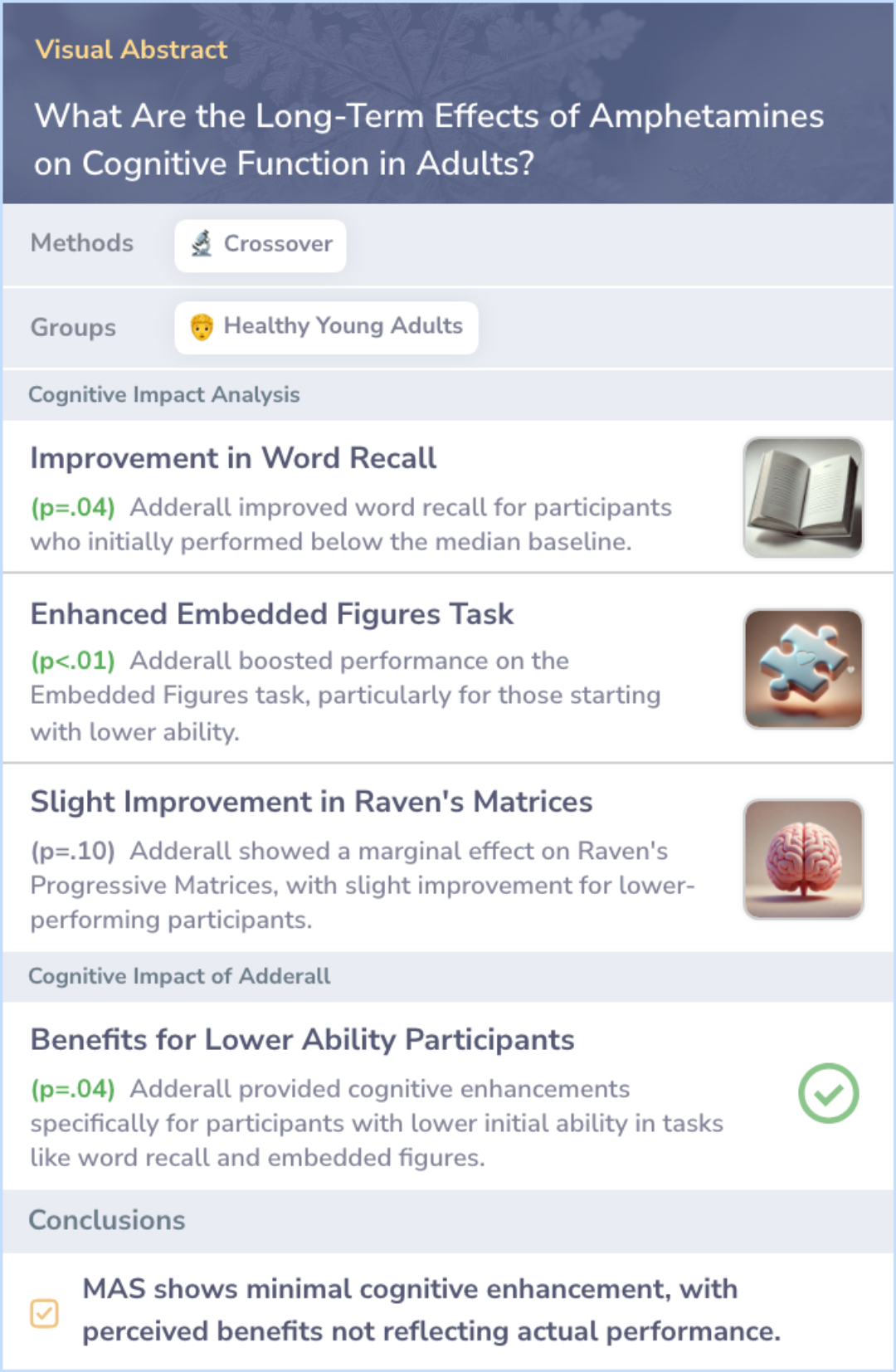
Peer Reviewed Study
Study: Minimal Cognitive Benefits of Adderall in Healthy Adults
Research shows that Adderall, a stimulant used to treat ADHD, has minimal effects on cognitive functions in adults without ADHD. A study on healthy college students found that while Adderall had some impact on mood and physical responses, it had little effect on enhancing cognitive performance.
These findings suggest that the belief in Adderall's cognitive benefits for healthy adults may be overstated. The small sample size means the results should be viewed cautiously.
These findings suggest that the belief in Adderall's cognitive benefits for healthy adults may be overstated. The small sample size means the results should be viewed cautiously.
author
Weyandt LL, White TL, Gudmundsdottir BG, Nitenson AZ, Rathkey ES, De Leon KA, Bjorn SA
journal
Pharmacy
Date Published
2018-06-27

Peer Reviewed Study
Study: Impact of Amphetamines on ADHD Symptoms in Adults
This study evaluated the impact of mixed amphetamine salts extended-release (MAS XR) on ADHD symptoms in adults over 4 weeks. Participants experienced significant reductions in ADHD symptoms with doses of 20, 40, and 60 mg/day, with the most significant improvements at the highest dose.
The study found that MAS XR provided up to 12 hours of symptom control, with improvements seen as early as the first week of treatment. Adverse effects were mild to moderate, with no significant cardiovascular changes reported.
The study found that MAS XR provided up to 12 hours of symptom control, with improvements seen as early as the first week of treatment. Adverse effects were mild to moderate, with no significant cardiovascular changes reported.
author
Weisler RH, Biederman J, Spencer TJ, Wilens TE, Faraone SV, Chrisman AK, Read SC, Tulloch SJ
journal
CNS Spectr.
Date Published
2006 Aug
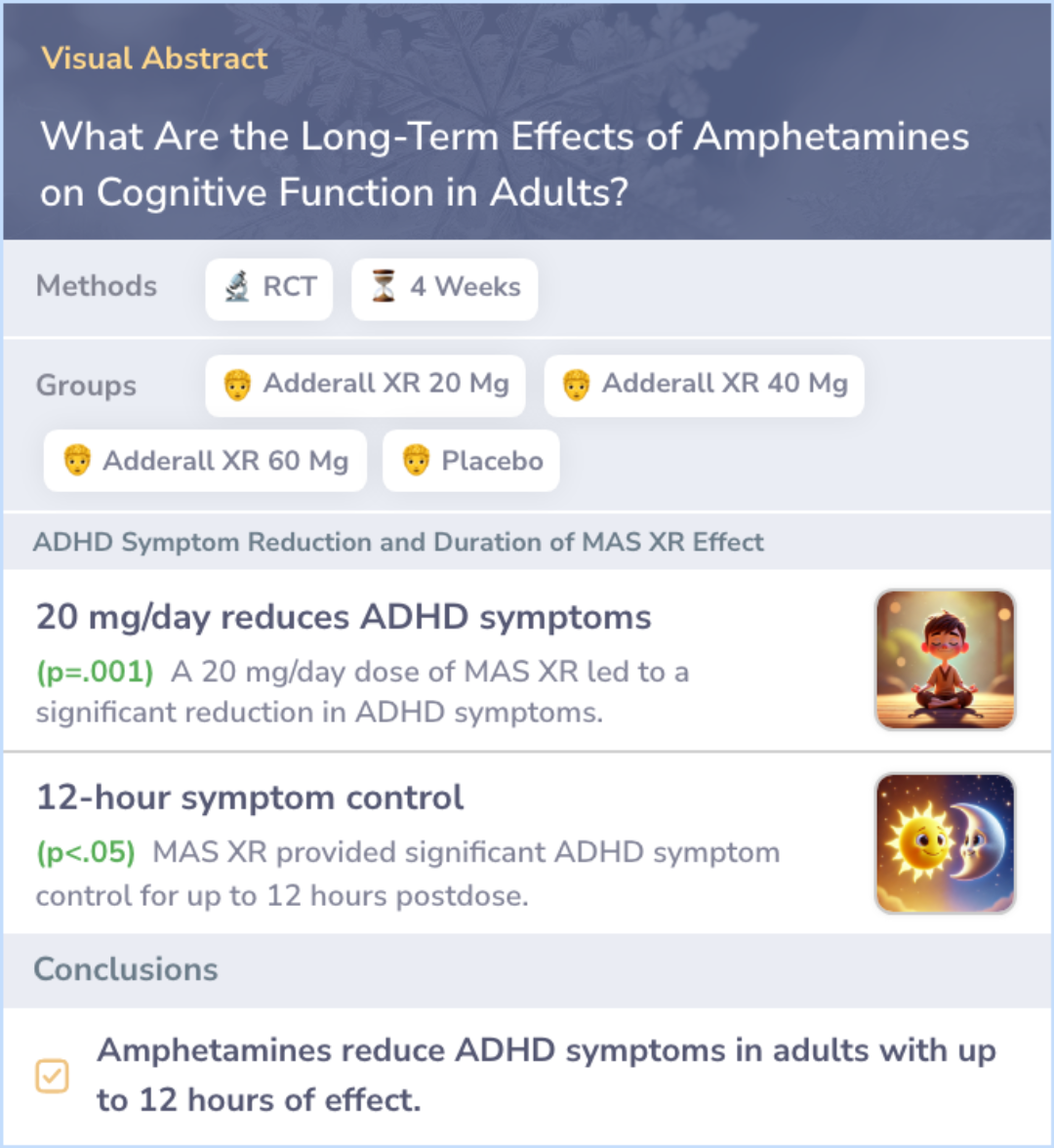
Key Takeaways
Conclusions
The long-term effects of amphetamines on cognitive function in adults present a complex picture. Studies show limited cognitive benefits from these substances, with healthy individuals typically experiencing little to no enhancement in cognitive abilities. Some users may perceive improved performance, but objective measures do not support sustained improvements.
Background research highlights potential changes in neurotransmitter levels and cerebral blood flow, emphasizing possible risks of neurotoxicity and alterations in dopamine regulation. These factors suggest caution in long-term use, highlighting the need for careful consideration of amphetamines' impact on brain health.
Background research highlights potential changes in neurotransmitter levels and cerebral blood flow, emphasizing possible risks of neurotoxicity and alterations in dopamine regulation. These factors suggest caution in long-term use, highlighting the need for careful consideration of amphetamines' impact on brain health.

Evidence Summary
ADHD's Impact on Executive Function and Amphetamines' Role
ADHD often brings challenges in executive function, affecting self-control and attention, which can impact everyday life and increase risky behaviors. These issues are rooted in genetics and distinct from intelligence. Individuals with ADHD typically struggle with executive functions like inhibition and planning. Such deficits can influence job performance and make one more prone to substance abuse.
Amphetamines, by altering neurotransmitter levels, may affect these cognitive functions, potentially exacerbating or mitigating the deficits seen in ADHD.
Amphetamines, by altering neurotransmitter levels, may affect these cognitive functions, potentially exacerbating or mitigating the deficits seen in ADHD.
Evidence Summary
Inhibitory Challenges and Reward Effects in ADHD
Research highlighted weak motor inhibition in children with different types of ADHD when compared with their non-ADHD peers. Interestingly, while kids with ADHD inattentive type showed some improvement with rewards, the timing of these rewards played a key role in their ability to focus.
There's a shared link in inhibitory control issues across ADHD subtypes, but differences emerge in how each subtype reacts to success or failure.
There's a shared link in inhibitory control issues across ADHD subtypes, but differences emerge in how each subtype reacts to success or failure.
Evidence Summary
Adderall and Creativity: A Cognitive Dilemma
Exploring how Adderall affects creativity brings up intriguing questions about its role in innovation. Used commonly for attention disorders, Adderall's impact on creative thinking adds a layer of complexity to its effects. A preliminary study focuses on whether taking Adderall shifts how people engage creatively, hinting at possible changes in innovativeness.
The study's context highlights the broader debate about balancing treatment benefits with potential impacts on cognitive processes like creativity.
The study's context highlights the broader debate about balancing treatment benefits with potential impacts on cognitive processes like creativity.
